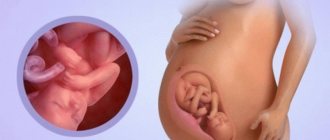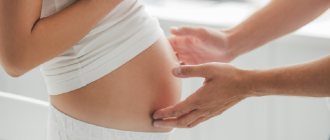The term “diarrhea” was inherited from the ancient Aesculapians and is translated from Greek as “expiring.” For more than a thousand years in a row, doctors have used this word to describe frequent bowel movements, in which the stool has a liquid consistency. Unfortunately, not a single person on earth is immune from diarrhea. And pregnant women in this “rating” are no exception, whether they are 5 weeks pregnant or 30.
Diarrhea during pregnancy is not a disease, but only a signal of problems with the expectant mother’s digestive system. Diarrhea at 40 weeks of pregnancy is considered absolutely normal: loose and frequent stools in a pregnant woman are associated with hormonal changes and are a harbinger of the long-awaited birth.
What are the causes of diarrhea? Is it an independent disease or just a symptom of the disease? Is diarrhea dangerous during pregnancy? What can be taken without endangering the health of the unborn baby? Is there a universal remedy for diarrhea? Many questions arise about this both in the doctor’s office and on forums on social networks. About everything in detail - in this article.
On average, food passes through the digestive tract in 24 to 72 hours. During this period, nutrients and water are absorbed into the blood. With diarrhea, the process accelerates significantly and most of the liquid and incompletely digested food passes through “transit” and is eliminated from the body. This is manifested by frequent bowel movements and liquid stool.
Did you know that...
Over the course of a person's lifetime, the average person produces 5 tons of excrement?
Diarrhea in the first trimester
Expecting a child is always associated with hormonal changes in the female body. Diarrhea in the first weeks of pregnancy is quite common.
In fairness, it is worth noting that not only this symptom can be a sign of pregnancy. More often, sudden vomiting, nausea and diarrhea are a “hint” for the mother about the birth of a new life. During pregnancy, this trinity is a sign of early toxicosis. Symptoms appear for no particular reason and at different times of the day.
Another sign of pregnancy before your missed period is increased sensitivity to odors.
In the early stages of pregnancy before the delay, a woman also notices fatigue, increased sensitivity of the mammary glands, slight discharge, and sometimes a stomach ache. In the first week of pregnancy, body temperature rises to 37°C. This is due to an increase in the level of the hormone progesterone.
Diarrhea in the first weeks of pregnancy may be associated with changes in taste preferences and unusual food combinations. For example, she is 5 weeks pregnant and a woman happily eats both sausage with orange and pickled cucumber with raspberry jam. And before pregnancy, she would never have agreed to such a food “extreme”.
During the period of metamorphosis, the female body can be unpredictable!
If diarrhea appears in the first trimester of pregnancy, do not forget about reasons such as food poisoning, acute intestinal infection or exacerbation of chronic diseases of the digestive system, such as gastritis.
Is diarrhea dangerous during early pregnancy?
Treatment should be started in consultation with your doctor. Especially if diarrhea is accompanied by fever, abdominal pain and vomiting. At 3-5 weeks of pregnancy, frequent contractions of the colon can increase the tone of the uterus and pose a threat of miscarriage.
When do you need a doctor's help?
The problem cannot be ignored in the last stages of pregnancy. Women suffering from the disorder should visit a doctor immediately. Diarrhea is not a disease, but it can alert you to dangerous diseases.
You need to make an appointment with a specialist if diarrhea continues for more than 5 days with pain, and at least one symptom accompanying the problem has been noticed. First of all, it is a headache and fever. Such factors foreshadow a rapid decline in immunity.
Among other things, diarrhea can be caused by parasites and viral diseases.
Second trimester
Doctors call this period the “golden” period of pregnancy. As hormonal changes occur and the body adapts to its new position, nausea and vomiting disappear, and the woman feels a surge of strength and energy. How's the baby? During the first three months of intrauterine development, all organs of a child are formed and functioning. In the second trimester, a period of intensive growth and development of the little man begins.
But the joy of the expectant mother can be marred not by an increase in waist size, but by heartburn, constipation, and diarrhea during pregnancy in the second trimester.
With diarrhea, a large amount of fluid and microelements is lost, which leads to dehydration and lack of nutrients, and impaired fetal development. If you are concerned about this, a pregnant woman should contact her doctor.
Is diarrhea dangerous in the last stages of pregnancy?
Diarrhea after the 38th week of pregnancy may indicate the body is preparing for childbirth
Starting from the 35th week, diarrhea may indicate the onset of labor. Moreover, up to 37 weeks is a rather dangerous sign, because the baby will be born premature. Diarrhea at 35, 36 and 37 weeks can also occur as a result of compression of the digestive organs by the fetus, which by this period is already quite large.
Diarrhea at this stage is dangerous due to the rapid development of dehydration.
Firstly, the pregnant woman moves little during this period due to heaviness, and secondly, the fetus itself needs a large amount of fluid. Doctors calmly react to diarrhea after the 38th week - this often indicates a natural cleansing of the body.
Third trimester
The causes of diarrhea during pregnancy in the third trimester may be the same factors as in women in the early stages.
Food poisoning
Unfortunately, a pregnant woman at any stage can encounter a similar problem.
The cause of diarrhea during pregnancy in the third trimester can be poor-quality food, consumption of products with non-compliance with shelf life, contaminated with pathogenic microbes.
Poisoning is accompanied by fever, nausea, vomiting, and frequent loose stools (10-15 times a day). Severe dehydration lowers blood pressure and may cause fainting.
Acute intestinal infections (salmonellosis, rotavirus infection, dysentery) deserve special attention during late pregnancy. If any of the above infectious diseases is suspected, the pregnant woman is taken to hospital treatment.
Chronic diseases of the gastrointestinal tract
Gastritis, peptic ulcer, cholecystitis, irritable bowel syndrome, enterocolitis may be accompanied by diarrhea in late pregnancy . Toxicosis of the first trimester against the background of these diseases takes longer and is more severe.
Diet violation
Diarrhea at 36 weeks of pregnancy, as in any other stage of pregnancy, can be associated with errors in nutrition, consumption of incompatible foods, and banal overeating.
Food allergies
Diarrhea in the first months of pregnancy and diarrhea in the 37th week of pregnancy may be associated with intolerance to certain foods - citrus fruits, berries, nuts, fish, chocolate, honey.
Often, stool disorder is accompanied by rashes and itchy skin.
Pancreatic enzyme deficiency
Deterioration in the digestion of fats, proteins and carbohydrates in the small intestine may be associated with chronic pancreatitis or congenital enzyme deficiency.
Cultural differences also play a role in the occurrence of frequent and loose stools. For example, residents of Foggy Albion go to the extreme less often than residents of South Asia - this is explained precisely by differences in nutrition.
Diarrhea at 39 weeks of pregnancy and at other stages requires immediate medical attention if there are:
- loose and profuse stool mixed with mucus or blood;
- repeated vomiting;
- diarrhea for more than a day without effect from treatment;
- stomach ache;
- fever;
- disturbance of consciousness;
- convulsions;
- signs of threatened miscarriage.
If you have the listed signs, call an ambulance immediately!
Types of constipation in pregnant women
There are 2 types of constipation in pregnant women:
- Gestational, which occur due to physiological changes caused by pregnancy;
- Constipation, which bothered the woman even before conception.
Statistically, bowel retention is more common at 12 weeks, although some symptoms, such as painful bowel movements and a feeling of incomplete emptying, are equally common at different periods4.
Depending on the cause, the following types of constipation are distinguished:2
- Organic – due to congenital anomalies, concomitant diseases or previous surgical operations;
- Functional – associated with disruption of the nervous regulation of digestion and stress.
Up to contents
Can diarrhea cause miscarriage?
Debilitating diarrhea increases the tone of the uterus and can provoke miscarriage in the early stages and premature birth in late pregnancy. With timely treatment, the chances of maintaining pregnancy are high.
What to do? How to treat a pregnant woman? After all, many drugs are contraindicated! First of all, therapy depends on the causes of diarrhea.
If there is an infection, the doctor will prescribe antibiotics, which can be used both for diarrhea at 4 weeks of pregnancy and for diarrhea at 38 weeks of pregnancy.
The list of such drugs is very limited, since many drugs are dangerous to the fetus. Therefore, do not self-medicate!
Replenishment of lost fluid is mandatory. For this purpose, you can take pharmaceutical saline solutions, or drink water and unsweetened tea.
Enterosgel intestinal sorbent will help reduce intoxication of the body - an effective cure for diarrhea in pregnant women! The drug has no contraindications or side effects and does not affect the development of the fetus or the tone of the uterus.
Thanks to taking the drug Enterosgel you can:
- Remove bacterial toxins and other toxic products from the intestines;
- Improve liver and kidney function;
- Eliminate bloating;
- Improve intestinal motility;
- Protect native microflora from viruses and pathogenic bacteria.
It is also recommended to drink medications containing beneficial lactobacilli for indigestion.
A diet is prescribed with the exclusion of fatty, salty, spicy foods, and fresh juices from the menu.
Nutritionists advise expectant mothers to eat small portions. Include in the menu:
- vegetable soups;
- steamed lean meat;
- yoghurts;
- boiled or baked vegetables;
- omelette;
- white crackers;
- fruit and berry jelly.
Diarrhea in pregnant women can also be treated with decoctions of medicinal plants, for example, oak bark, chamomile flowers, calendula, wormwood.
Bloating, constipation and microbiota during pregnancy
Excessive gas and constipation during pregnancy can be caused by hormonal changes, such as increased production of progesterone. This hormone, essential for nourishing the uterus and embryo, relaxes the muscles of the body, including the intestinal muscles, which slows digestion and increases flatulence. A similar reaction of the body can be observed before each menstruation, when the production of progesterone increases.
7 Foods That Cause Increased Gas and Bloating
Flatulence is bloating due to the accumulation of gases.
Here are a few simple rules that will help improve intestinal motility and avoid constipation and bloating:
- If you don't usually eat a lot of fiber and difficult-to-digest foods like legumes, try to gradually introduce them into your diet;
- Do not abuse carbonated drinks and fatty foods;
- Move more;
- Drink more fluids.
If bloating and constipation are accompanied by severe pain that lasts more than 30 minutes, or if you have been constipated for two or more weeks, consult your doctor.
Microbiota and gut bacteria during pregnancy
During pregnancy, a woman's body goes through many changes, and this can affect the microbiota - the ecosystem of bacteria living in the intestines. Trillions of microorganisms perform important work for the whole body: they synthesize vitamins and important acids, support the functioning of your intestines and protect it from disease and inflammation.
The additional influx of female hormones that accompanies pregnancy changes intestinal function and affects the microbiota. This is good because the bacterial community is constantly adjusting to external and internal conditions to keep up with the body's needs.
In order for your gut bacteria to continue to keep your digestion running smoothly, they need your help. Provide them with healthy foods and plant fibers. Fruits, vegetables, whole grains, nuts and seeds contain prebiotics - special substances that feed beneficial bacteria. When properly balanced, the bacteria even increase your body's defenses against harmful microorganisms that can cause gastroenteritis during pregnancy.
What foods contain fiber?
The Atlas microbiota test will help you understand how to prepare your gut for future pregnancy and reduce the risk of digestive problems.
How to avoid diarrhea during pregnancy, how and how to protect yourself?
Following these 5 simple rules will greatly reduce the likelihood of diarrhea during pregnancy.
- Don't forget about personal hygiene - wash your hands before eating. Do not consume expired products;
- Do not eat in establishments with a dubious reputation;
- Do not eat food that is not the first freshness;
- Don't overeat;
- When planning a pregnancy, treat chronic diseases.
And one more thing: we all carry a mobile phone with us everywhere. According to the rule of etiquette, on which side of the plate should it be? Jokes aside, as a result of a recent study, scientists found that every sixth phone contains E. coli - bacteria that live in feces. E. coli “with a slight movement of the hand” moves to your plate! There is only one conclusion - wash your hands after visiting the toilet!
Health to you and your baby!
Prevention measures
To prevent diarrhea from occurring in the third trimester, a woman needs to take preventive measures:
- Carefully monitor hygiene. Wash your hands before eating, after each trip to the toilet, and upon returning home.
- Pregnant women should avoid visiting cafes and restaurants, and also beware of street food.
- All vegetables, berries, and fruits must be washed before consumption. A woman should not get carried away with these products, because they provoke diarrhea.
- A woman should ensure that food does not spoil in the refrigerator.
- Avoid dehydration.
Diarrhea in the third trimester occurs for many reasons. A pregnant woman should not ignore the problem, as diarrhea can harm the baby's health. To get rid of stool disorders, there are effective and safe methods. But diarrhea can be prevented if you take preventive measures and listen to your body.
Previous post Why does diarrhea with vomiting occur during pregnancy and what to do about it?
Next entry Causes and treatment of diarrhea in late pregnancy
Can pregnant women take laxatives?
When carrying a child, you must be especially careful when taking medications that can harm both mother and baby. Laxatives during pregnancy are prescribed only by a gynecologist or attending physician.
The wrong medicine can cause bleeding, miscarriage and premature birth. It is better to prevent constipation than to treat it.
Natural laxatives for pregnant women
Constipation during pregnancy causes inconvenience, but not every laxative is reliable in this situation. During pregnancy, a hormonal imbalance occurs, the muscular structure of the esophagus weakens and cannot cope with the load. The laxative used should not irritate the digestive tract, so it is not recommended to drink synthetic products. It is especially dangerous to self-medicate, because some medications provoke uterine hypertonicity.
A woman should take a closer look at natural products that have a mild effect. You can use against constipation:
- whole grain porridge, bran;
- apples, figs, dried apricots, prunes;
- fresh vegetables;
- nuts;
- grapefruit.
At home, you can prepare your own natural laxative for pregnant women. Grinded steamed dried apricots are mixed with crushed carrot cake in a blender. If carrots are unavailable, they are replaced with pumpkin. The effect of eating the above foods will help strengthen the correct drinking regime. You need to drink at least 2 liters of clean water per day.
For a natural laxative to work, you must adhere to proper nutrition:
- five meals a day;
- a balanced diet consisting of vitamins, minerals, proteins, carbohydrates and fats;
- small portions;
- protein foods in the morning, and plant and dairy products in the evening;
- exclude walnuts, strong tea, rice and boiled eggs, which provoke the appearance of pathology;
- Every day you need to eat borscht, soups, broths;
- 2 hours before bedtime should be the last meal;
- fiber and plant fibers are added.
If a woman has suffered from constipation before, but her diet changes in the early stages of pregnancy.
Laxatives prohibited during pregnancy
Dangerous substances are divided into three categories:
- Annoying
. Laxatives during pregnancy sometimes cause reflex contractions. These are Bisacodyl, Carlsbad salt, castor oil, senna products. Medicines are toxic, mutagenic and lead to severe abnormalities of the enteric nervous system. - Detergents.
This category consists of mineral oils that are deposited in the spleen, liver, and intestines. The drug interferes with the absorption of fat-soluble vitamins and causes an inflammatory process. - Bulk laxatives
. The composition of such products includes hydrophilic colloids and dietary fiber. When taking them, you will need to drink a large amount of liquid, which causes severe swelling when carrying a child.
It is also prohibited to take medications based on seaweed, cellulose, agar-agar, or flax. These components help slow down the excretion of fluid in the female body. The most dangerous laxatives are considered to be saline laxatives, which have a laxative effect and disrupt the water-salt balance.
Uncontrolled use of such drugs leads to increased constipation. All of the above medications are prohibited for use during pregnancy.








